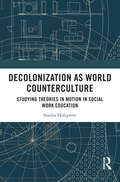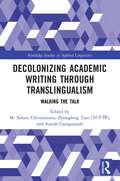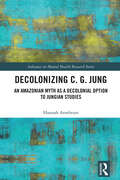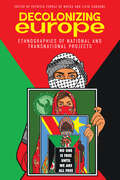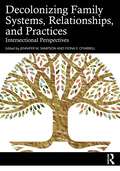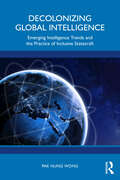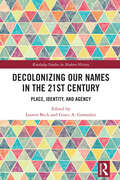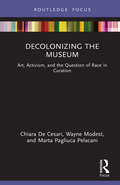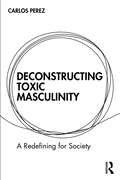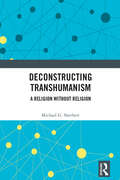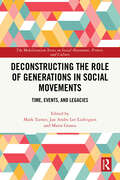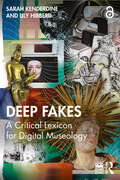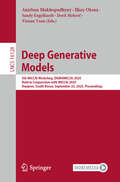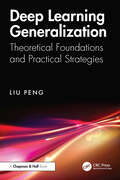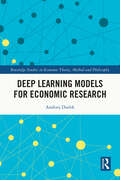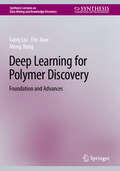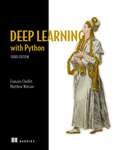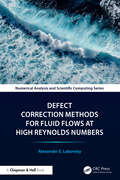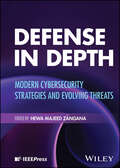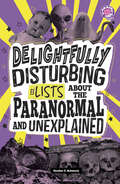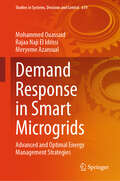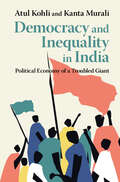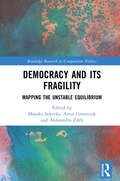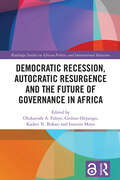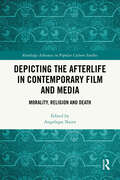- Table View
- List View
Decolonization as World Counterculture: Studying Theories in Motion in Social Work Education
by Sandra HoltgreveDecolonization as World Counterculture captures the underlying conditions of the rise of post- and decolonial theories by asking how we arrived at this moment when decolonial arguments seem to be everywhere and yet not enough.While efforts to decolonize knowledge and disciplines continue to expand, this book takes a different, theory-reflecting approach. It examines instead how decolonization itself has become a global although unequally addressed phenomenon. Bringing together world culture research with postcolonial studies in the field of social work, the book analyzes social work curricula from Germany, Mexico, and Ecuador to explore how (de)coloniality is embedded in diverging horizons of meanings but shaped by strikingly similar institutions in the educational setting. To this end, the book offers a knowledge sociological view on how decolonization itself is globalized. It mobilizes the neo-institutional approach of world culture to describe the decolonial imperative as “world counterculture,” an integrative frame of otherwise different and diverging social justice agendas. In this way, taking the theoretical premises of decolonization seriously, the book examines the promises and limitations of connecting decolonization with Western theories of globalization.Assembling these distinct pieces of a puzzle spanning different fields, this book is a testimony to the most successful and thriving theoretical views of the last decades in the human and social sciences. It is sure to challenge, fascinate, and inspire readers across the specialist fields of postcolonial studies, the sociology of knowledge, global social theory, and international social work.
Decolonizing Academic Writing through Translingualism: Walking the Talk (Routledge Studies in Applied Linguistics)
by Suresh Canagarajah M. Sidury Christiansen Tian 田中锋 ZhongfengThis collection explores innovative ways to embody translingual practices in academic writing, showcasing how multilingual authors can effectively leverage their linguistic resources in research and publication. Recognizing that traditional academic writing often suppresses multilingual voices, this book advocates for a decolonized approach that embraces diverse linguistic expressions and knowledge representations for social change.This volume features perspectives from scholars across various disciplines and linguistic backgrounds presenting their unique visions of discursive, rhetorical, and linguistic diversity in academic writing. Each chapter showcases its respective author’s critical reflections on their language choices. This book offers a counterpoint to existing literature by making the case for the register known as “academic English” as a form both open to change and possible for accommodating diversity, empowering scholars to negotiate the register’s norms around their own languages and establish spaces for their own unique voices and identities.This book serves as a valuable resource for graduate students, faculty, and scholars interested in academic writing, TESOL, composition studies, language teaching and learning, and applied linguistics.
Decolonizing C. G. Jung: An Amazonian Myth as a Decolonial Option to Jungian Studies (Advances in Mental Health Research)
by Hannah ArmbrustThis book puts forth a “decolonial option” to C. G. Jung’s work as part of a new overview of his thoughts and writings.Challenging traditional Eurocentric views of the psyche, it presents a novel interpretation of Jung’s theories through the concept of archetypal intersubjectivity, Indigenous mythology, and dream analysis based on diatopic hermeneutics. Using myths, and specifically an archetypal story from the Huni Kuin (also known as Kaxinawa) people, it examines how mythic narratives are conceived from an emotionally charged experience and further conceptualizes these narratives as an important psychic archive to help people make sense of raw emotions.A fresh and lively exploration of C. G. Jung’s work, this book will appeal to scholars and students with interests in Indigenous mythologies, Jungian studies, dream analysis, decolonial studies, and depth psychology.
Decolonizing Europe: Ethnographies of National and Transnational Projects
by Patrícia Ferraz de Matos Livio SansoneRevived by the global resonance of the Black Lives Matter movement in 2020, this book adds to the current discussion on the idea of decolonizing Europe. Drawing inspiration from the study of colonialism, postcolonialism and the imperative to decolonize knowledge and practice, the editors bring together a group of scholars approaching these issues through ethnographic inquiry. The volume explores how race, colonial legacies and structural inequality are addressed across diverse European contexts – north, central, eastern and southern – as well as in their entanglements with regions beyond Europe. It offers critical, grounded insights into the possibilities and challenges of decolonial thinking today.
Decolonizing Family Systems, Relationships, and Practices: Intersectional Perspectives
by Jennifer M. Sampson Fiona E. O’FarrellCentering liberation, justice, and cultural wisdom in the heart of relational work, this book provides a comprehensive and integrative examination of human development and the family life cycle through a decolonized, anti‑racist, and intersectional lens.Written by a diverse collection of practitioners, educators, and scholars, tht book challenges the colonial roots of foundational family therapy models and offers bold alternatives that center agency, community, and healing. Chapters discuss essential topics such as family development and stages of the life cycle, relationship norms, gender and sexuality, neurovariance, grief and loss, healing, and more – all while exploring the ways in which systemic inequalities shape the lived experiences of individuals and families from diverse backgrounds. With real‑life stories and perspectives, this book provides essential practical guidance and tools to help mental health practitioners navigate and resist systemic barriers in their work and support an ongoing practice that fosters more inclusive, equitable, and responsive therapeutic relationships.This book offers a new path forward for anyone who wants to practice healing in ways that are culturally affirming, politically conscious, and radically human. It is an essential resource for graduate students and practitioners in mental health programs seeking to develop their skills in working with diverse families.
Decolonizing Global Intelligence: Emerging Intelligence Trends and the Practice of Inclusive Statecraft
by Pak Nung WongFrom September 11 to the calamitous withdrawal of United States troops from Afghanistan, Western intelligence has failed to negotiate the largest military and humanitarian crises across the world. This book proposes to decolonize global intelligence from the peripheries of the Global South and put forward a new intelligence practice of ‘inclusive statecraft’.It shows how dominant Western intelligence systems have failed to protect the very ideas they promised to uphold and the discrepancy between the West’s ‘Responsibility to Protect (R2P)’ liberalist doctrine and the realist on-the-ground complex reality as observed by the ‘Failure to Protect (F2P)’ scholarships. Drawing theoretical insights and empirical (both historical and contemporary) materials from a wide array of case studies of Western and non-Western intelligence settings and practices as well as their interactions, it argues that the next generation of global security and intelligence practitioners will necessitate genuine interracial, non-anthropocentric and cross-cultural inclusivity, especially the capability to take the non-Western intelligence cultures and their realist strategic thoughts seriously.This book will not just add new knowledge to the larger field of security and intelligence studies, but will also pioneer the relatively underdeveloped fields of comparative intelligence cultures, and interstellar intelligence/cultural studies. It will be indispensable for policymakers, bureaucrats and government officials.
Decolonizing Our Names in the 21st Century: Place, Identity, and Agency (Routledge Studies in Modern History)
by Lauren Beck Grace A. GomashieThis book combines different decolonial approaches from around the world to offer a roadmap for updating names and naming practices, restoring and protecting precolonial ones, and reimagining or recontextualizing the relationship between place, identity, and names.In a postcolonial context, naming often serves as a bitter reminder of past harms through commemorative naming practices, whether through a system of baptismal names or a former colony’s approach to dealing with the names that the colonizer left behind. This volume assembles authors who hail from formerly colonized regions of the Americas, Europe, Africa, and Asia to engage with this problem of decolonizing names in the twenty-first century from a global perspective. The book also points to what strategies have had more success than others while envisioning the tools needed for progress in the future.Offering a useful framework with approaches that can easily be used across other geographical contexts, this volume is suitable for scholars and students interested in decolonization, identity, and naming practices.
Decolonizing the Museum: Art, Activism, and the Question of Race in Curation (Museums in Focus)
by Wayne Modest Chiara De Cesari Marta Pagliuca PelacaniThis book asks what it means to decolonize museums in theory and practice. It explores recent calls by activists and artists for social change in and through museums and how museums have responded to these calls and interventions.The point of departure for this volume is the burgeoning global debates around racism that have compelled many museums and public institutions to confront their complicity in colonialism, both past and present. Building on interviews with curators, cultural practitioners, activists, and artists, as well as the authors' ongoing involvement with movements aimed at decolonizing museums, this volume explores how anti-racist activism and artivism have transformed museums, as well as the broader social and political significance of these transformations. The book focuses on the practices, approaches, and strategies that are being adopted in efforts to decolonize museums and cultural institutions, where they succeed and fail, and the similarities and differences between these initiatives. It discusses specific exhibitions and whether they represent colonialism as a past phenomenon or as enduring racial logics forcefully shaping the present. It analyzes both mainstream European museums and grassroots, museum-like initiatives that aim to reckon with colonialism and race in different contexts. Core to the argument is the issue of how memory, heritage, and museum studies, the disciplines that explore, explain, and staff museums, have engaged or not with race.Decolonizing the Museum will be valuable for those studying or researching in the fields of museum studies, heritage, memory and art studies, decolonial theory, postcolonialism, race and racism, and cultural politics. Providing an important window into the political role of curators and the politics of race in transforming museums, it will also be beneficial to museum practitioners and activists and artists with a stake in these institutions.
Deconstructing Toxic Masculinity: A Redefining for Society
by Carlos PerezThis accessible book explores toxic masculinity, looking at how to define it, and how we can and should challenge its spread. This book draws on Derrida’s deconstruction, using the philosophical lens to deconstruct what toxic masculinity means and to better understand its significance for our society. It focuses on how harmful aspects of masculinity spread, infiltrate, and intoxicate our societies and how existing structures allow aspects of harmful masculinity to become toxic. This book also features discussions and analysis of participants’ lived experiences of masculinities, alongside the author’s reflections. It explores the relevance of toxic masculinity in work environments, politics, relationships, and gender roles and seeks to challenge and mitigate its damages for everyone. Encouraging critical thinking and understanding of healthier ways of being for all, this timely book will be of interest to therapists, counselors, teachers, and practitioners of family studies. It will also be useful reading for students in the fields of psychology, gender studies, sociology, and related fields.
Deconstructing Transhumanism: A Religion Without Religion
by Michael G. SherbertDeconstructing Transhumanism: A Religion Without Religion challenges the widely held view that transhumanism—a movement advocating for the enhancement of human life through technology—is purely secular and scientific. Instead, this groundbreaking study reveals how transhumanist thought remains deeply shaped by religious ideas, particularly those rooted in Christianity. Drawing on the philosophy of Jacques Derrida, Michael G. Sherbert explores how religious concepts like the sacred, messianism, salvation, and transcendence quietly persist within transhumanist visions of the future—often without reflection on the potential dangers they carry.From artificial intelligence to the dream of digital immortality, this book uncovers how technological aspirations often mirror age-old religious hopes. Through a careful analysis of leading figures such as Ray Kurzweil, David Pearce, and Nick Bostrom, Sherbert shows that even the most futuristic goals often retain hidden religious structures—what Derrida calls a “religion without religion.”Spanning philosophical inquiry, ethical reflection, and cultural critique, Deconstructing Transhumanism invites readers to rethink the assumptions behind some of today’s most influential ideas about technology, progress, and the future. It offers a timely examination of the religious undercurrents shaping Western technological imaginaries—urging greater awareness of the powerful, and sometimes perilous, narratives we carry into our increasingly high-tech future.
Deconstructing the Role of Generations in Social Movements: Time, Events, and Legacies (The Mobilization Series on Social Movements, Protest, and Culture)
by Maria Grasso Mark Turner Jan Andre Lee LudvigsenAlthough questions of how a social group’s shared experiences growing up in particular historical and social contexts shapes their identities, including their political identities, have engaged sociologists of family, youth, citizenship, culture, and political change, few books have so far examined the specific role of generations and generational consciousness in social movement activism. As such, this is the first book to focus exclusively on issues of temporality, events, and generational legacies in social movements. In demonstrating how generational consciousness, and specific frames, narratives, and repertoires of contention are shaped by, and respond to, historical and contemporary meanings of major events and social transformations in different locations, new important questions on race, class, ethnicity, gender, sexuality, and citizenship are revealed at new, emerging critical junctures in the twenty-first century,With its high-quality chapters and transnational scope, this book will capture several key trends in the role of generations in social movements and explores topics including contemporary feminism, family, and intergenerational transmission, generationality and political change, rituals and social change, and Black politics and US democracy.This is an invaluable resource for students and academics with an interest in sociology, political science, and the study of social movements and social change, and for policymakers and readers with a general interest in intergenerational conflict and the challenges of engaging new youth generations in political and democratic structures and processes.
Deep Fakes: A Critical Lexicon for Digital Museology
by Sarah Kenderdine Lily HibberdDeep Fakes: A Critical Lexicon for Digital Museology is an illustrated monograph articulated through a comprehensive lexicon of key concepts in next-generation museology. Each of the book’s ten chapters explores specific terms in the lexicon, further interpreted through installations from the 2021 exhibition Deep Fakes: Art and Its Double in Switzerland.Deep Fakes: A Critical Lexicon for Digital Museology contends with the intensification of questions compounded by rapid technological change affecting contemporary museological and curatorial authority. This book introduces a novel theorization of computational techniques and their transformation of museological objects in the form of cultural deep fakes—the consummate shape-shifting doppelgängers of the post-digital age. Conceived by Sarah Kenderdine and written by Lily Hibberd, this volume elaborates on a spectrum of established theoretical concepts, including affect, aura, authenticity, embodied knowledge, mimesis, the post-original, presence, replication, reenactment, and the simulacrum. Grounded in the methods and techniques of computational museology and participatory visitor experience, it critically examines the practical, epistemological, societal, and ethical implications of emerging technologies and their cultural heritage material. Harnessing the affordances of these transformative approaches for communities and societies, this critical lexicon empowers future-focused curatorship for memory organizations.This book supports museum professionals in navigating the ramifications of dynamic technological change. Readers include directors, curators, researchers, and designers. Archival and imaging scientists, data managers, and software engineers are also broadly implicated. It has added significance for research disciplines in the history and theory of art and media studies, critical and cultural theory, digital humanities, and museum studies, alongside artists and producers in the cultural domain.
Deep Generative Models: 5th MICCAI Workshop, DGM4MICCAI 2025, Held in Conjunction with MICCAI 2025, Daejeon, South Korea, September 23, 2025, Proceedings (Lecture Notes in Computer Science #16128)
by Anirban Mukhopadhyay Sandy Engelhardt Ilkay Oksuz Yixuan Yuan Dorit MehrofThis book constitutes the proceedings of the 5th Workshop on Deep Generative Models for Medical Image Computing and Computer Assisted Intervention, DGM4MICCAI 2025, held in conjunction with the 28th International Conference on Medical Image Computing and Computer Assisted Intervention, MICCAI 2025, in Daejeon, South Korea, during September 2025.The 33 papers presented in this book were carefully reviewed and selected from 50 submissions. These papers deal with recent algorithmic developments, new results, and promising future directions in Deep Generative Models.
Deep Learning Generalization: Theoretical Foundations and Practical Strategies
by Liu PengThis book provides a comprehensive exploration of generalization in deep learning, focusing on both theoretical foundations and practical strategies. It delves deeply into how machine learning models, particularly deep neural networks, achieve robust performance on unseen data. Key topics include balancing model complexity, addressing overfitting and underfitting, and understanding modern phenomena such as the double descent curve and implicit regularization.The book offers a holistic perspective by addressing the four critical components of model training: data, model architecture, objective functions, and optimization processes. It combines mathematical rigor with hands-on guidance, introducing practical implementation techniques using PyTorch to bridge the gap between theory and real-world applications. For instance, the book highlights how regularized deep learning models not only achieve better predictive performance but also assume a more compact and efficient parameter space. Structured to accommodate a progressive learning curve, the content spans foundational concepts like statistical learning theory to advanced topics like Neural Tangent Kernels and overparameterization paradoxes.By synthesizing classical and modern views of generalization, the book equips readers to develop a nuanced understanding of key concepts while mastering practical applications.For academics, the book serves as a definitive resource to solidify theoretical knowledge and explore cutting-edge research directions. For industry professionals, it provides actionable insights to enhance model performance systematically. Whether you're a beginner seeking foundational understanding or a practitioner exploring advanced methodologies, this book offers an indispensable guide to achieving robust generalization in deep learning.
Deep Learning Models for Economic Research (Routledge Studies in Economic Theory, Method and Philosophy)
by Andrzej DudekIn today’s data-driven world, the ability to make sense of complex, high-dimensional datasets is crucial for economists and data scientists. Traditional quantitative methods, while powerful, often struggle to keep up with the complexities of modern economic challenges. This book bridges this gap, integrating cutting-edge machine learning techniques with established economic analysis to provide new, more accurate insights.The book offers a comprehensive approach to understanding and applying neural networks and deep learning models in the context of conducting economic research. It starts by laying the groundwork with essential quantitative methods such as cluster analysis, regression, and factor analysis, then demonstrates how these can be enhanced with deep learning techniques like recurrent neural networks (RNNs), convolutional neural networks (CNNs), and transformers. By guiding readers through real-world examples, complete with Python code and access to datasets, it showcases the practical benefits of neural networks in solving complex economic problems, such as fraud detection, sentiment analysis, stock price forecasting, and inflation factor analysis. Importantly, the book also addresses critical concerns about the “black box” nature of deep learning, offering interpretability techniques like Local Interpretable Model-agnostic Explanations (LIME) and SHapley Additive exPlanations (SHAP) to demystify model predictions.The book is essential reading for economists, data scientists, and professionals looking to deepen their understanding of AI’s role in economic modeling. It is also an accessible resource for non-experts interested in how machine learning is transforming economic analysis.
Deep Learning for Polymer Discovery: Foundation and Advances (Synthesis Lectures on Data Mining and Knowledge Discovery)
by Gang Liu Meng Jiang Eric InaeThis book presents a comprehensive range of topics in deep learning for polymer discovery, from fundamental concepts to advanced methodologies. These topics are crucial as they address critical challenges in polymer science and engineering. With a growing demand for new materials with specific properties, traditional experimental methods for polymer discovery are becoming increasingly time-consuming and costly. Deep learning offers a promising solution by enabling rapid screening of potential polymers and accelerating the design process. The authors begin with essential knowledge on polymer data representations and neural network architectures, then progress to deep learning frameworks for property prediction and inverse polymer design. The book then explores both sequence-based and graph-based approaches, covering various neural network types including LSTMs, GRUs, GCNs, and GINs. Advanced topics include interpretable graph deep learning with environment-based augmentation, semi-supervised techniques for addressing label imbalance, and data-centric transfer learning using diffusion models. The book aims to solve key problems in polymer discovery, including accurate property prediction, efficient design of polymers with desired characteristics, model interpretability, handling imbalanced and limited labeled data, and leveraging unlabeled data to improve prediction accuracy.
Deep Learning with Python, Third Edition
by Matthew Watson Francois CholletThe bestselling book on Python deep learning, now covering generative AI, Keras 3, PyTorch, and JAX!Deep Learning with Python, Third Edition puts the power of deep learning in your hands. This new edition includes the latest Keras and TensorFlow features, generative AI models, and added coverage of PyTorch and JAX. Learn directly from the creator of Keras and step confidently into the world of deep learning with Python. In Deep Learning with Python, Third Edition you&’ll discover: • Deep learning from first principles • The latest features of Keras 3 • A primer on JAX, PyTorch, and TensorFlow • Image classification and image segmentation • Time series forecasting • Large Language models • Text classification and machine translation • Text and image generation—build your own GPT and diffusion models! • Scaling and tuning models With over 100,000 copies sold, Deep Learning with Python makes it possible for developers, data scientists, and machine learning enthusiasts to put deep learning into action. In this expanded and updated third edition, Keras creator François Chollet offers insights for both novice and experienced machine learning practitioners. You'll master state-of-the-art deep learning tools and techniques, from the latest features of Keras 3 to building AI models that can generate text and images. About the technology In less than a decade, deep learning has changed the world—twice. First, Python-based libraries like Keras, TensorFlow, and PyTorch elevated neural networks from lab experiments to high-performance production systems deployed at scale. And now, through Large Language Models and other generative AI tools, deep learning is again transforming business and society. In this new edition, Keras creator François Chollet invites you into this amazing subject in the fluid, mentoring style of a true insider. About the book Deep Learning with Python, Third Edition makes the concepts behind deep learning and generative AI understandable and approachable. This complete rewrite of the bestselling original includes fresh chapters on transformers, building your own GPT-like LLM, and generating images with diffusion models. Each chapter introduces practical projects and code examples that build your understanding of deep learning, layer by layer. What's inside • Hands-on, code-first learning • Comprehensive, from basics to generative AI • Intuitive and easy math explanations • Examples in Keras, PyTorch, JAX, and TensorFlow About the reader For readers with intermediate Python skills. No previous experience with machine learning or linear algebra required. About the author François Chollet is the co-founder of Ndea and the creator of Keras. Matthew Watson is a software engineer at Google working on Gemini and a core maintainer of Keras. Table of Contents 1 What is deep learning? 2 The mathematical building blocks of neural networks 3 Introduction to TensorFlow, PyTorch, JAX, and Keras 4 Classification and regression 5 Fundamentals of machine learning 6 The universal workflow of machine learning 7 A deep dive on Keras 8 Image classification 9 ConvNet architecture patterns 10 Interpreting what ConvNets learn 11 Image segmentation 12 Object detection 13 Timeseries forecasting 14 Text classification 15 Language models and the Transformer 16 Text generation 17 Image generation 18 Best practices for the real world 19 The future of AI 20 Conclusions
Defect Correction Methods for Fluid Flows at High Reynolds Numbers (Chapman & Hall/CRC Numerical Analysis and Scientific Computing Series)
by Alexander E. LabovskyDefect Correction Methods for Fluid Flows at High Reynold’s Numbers presents the mathematical development of defect correction methods (DCM) in application to fluid flow problems in various settings. We will show several approaches to applying the DCM ideas in computational fluid dynamics (CFD) – from a basic idea of controlling the flow by the means of increased diffusion, to the state-of-the-art family of novel, DCM-based turbulence models. The main idea of the methods presented in this book, is to use defect correction in turbulence modelling; additionally, several methods will also be presented, that aim at reducing the time discretization error.Features · Provides a road map, starting from the ideas of minimally invasive controlling of turbulent flows, to the ways of improving the existing regularization techniques with DCM, to the ideas of ‘full defect correction’ in both space and time and, finally, to the more complex embedding of the DCM into turbulence modelling by the ‘correction’ of the whole turbulence model· Can be used for teaching a topics course on a Masters or Ph.D. level. It is even more suitable as a reference for CFD theorists and practitioners, with most of the methods being minimally invasive and, therefore, easy to implement in the existing/legacy codes· Discusses the current challenges in turbulence modelling with defect correction, showing several possible directions for future developments. Two source codes are provided – one for a regularization technique and another for a novel turbulence model – in order to give an interested researcher a quick start to the topic of DCM in CFD.
Defense in Depth: Modern Cybersecurity Strategies and Evolving Threats
by Hewa Majeed ZanganaUp-to-date reference on the evolving landscape of cybersecurity, focusing on strategies that integrate AI, blockchain, and human factors Defense in Depth delivers a comprehensive guide to the rapidly developing field of digital threats and defenses. This book examines how defense-in-depth approaches integrate multiple layers of security to protect against a wide range of threats; how AI technologies are being utilized for threat detection, response, and prediction; and how blockchain technology can be leveraged to enhance security measures, particularly in ensuring data integrity and securing transactions. Case studies of significant cyberattacks are included throughout the text to elucidate key concepts. The book discusses additional topics such as: The critical importance of cybersecurity in today’s interconnected world and the historical evolution of cyber threats, highlighting modern attack vectorsCore principles of defense, detailing layered security measures across networks, applications, data, and endpointsHuman factors, often the weakest link in cybersecurity, with strategies for mitigating risksMachine learning and neural networks and their usage in AI-driven security solutions across finance, healthcare, and governmentAdvanced defense techniques, practical applications, and future directions in cybersecurity Defense in Depth is an essential reference on the state of the art in the field for cybersecurity professionals, IT practitioners, and researchers. It is also an excellent learning aid for advanced students in cybersecurity, particularly those in graduate programs.
Delightfully Disturbing Lists About the Paranormal and Unexplained
by Heather E. SchwartzSpooky season can be all year long when the scariest, most spine-tingling facts are collected in this book of delightfully disturbing lists. Chapters make the content event more digestible. Full-color images and inviting designs will engage readers’ minds and get them excited to learn more.
Demand Response in Smart Microgrids: Advanced and Optimal Energy Management Strategies (Studies in Systems, Decision and Control #619)
by Mohammed Ouassaid Rajaa Naji El Idrissi Meryeme AzaroualThis book covers the optimization of the energy flow management of a grid-tied photovoltaic-wind-battery energy storage system and the development of demand response algorithms for a single customer at the lowest level and extended it to a large community of participants at the highest level. Hence, this book consists of two parts. The first part is devoted to the design of energy management strategies for a residential PV-WT system, while considering time of use and feed in tariff schemes. Further, the developed management algorithms mitigate the greenhouse gas emissions. Additionally, a closed-loop control based-model predictive control scheme, to forecast the system behavior and deal with renewable energy resources and load disturbances, is elaborated. The second part is dedicated to developing effective demand side management techniques and cooperative energy scheduling in the framework of collective smart-buildings. Cooperative energy scheduling programs are designed while considering three objectives: minimizing peak load, minimizing electricity cost, and avoiding the occurrence of rebound peaks. Optimal consumption decisions are examined in residential, commercial, and industrial areas. Besides, the impact of electric vehicle charging methods is investigated for different EV penetration levels. Also, a game theory approach for energy consumption scheduling of a community of smart microgrids is built. In summary, this book successfully establishes the important synergy between microgrid energy management and demand response at the level of a smart home and an aggregated building community. The above aspects are illustrated in this book in 12 chapters. The scope is broad. This book chapters are very effective in theoretical analysis and design of optimization algorithms in the realm of smart grids. This book is intended to provide advanced undergraduate, graduate students, engineers, researchers on energy management within smart homes and clustered buildings, with a comprehensive understanding of various methods and designed algorithms. These strategies and algorithms aim to deal with defies ranging from augmented adoption of microgrids to the introduction of demand response approaches, to enhance the grid viability and resilience.
Democracy and Inequality in India: Political Economy of a Troubled Giant
by Atul Kohli Kanta MuraliContemporary India provides a giant and complex panorama that deserves to be understood. Through in-depth analysis of democracy, economic growth and distribution, caste, labour, gender, and foreign policy, Atul Kohli and Kanta Murali provide a framework for understanding recent political and economic developments. They make three key arguments. Firstly, that India's well-established democracy is currently under considerable strain. Secondly, that the roots of this decline can be attributed to the growing inequalities accompanying growth since the 1990s. Growing inequalities led to the decline of the Congress party and the rise of the BJP under Narendra Modi. In turn, the BJP and its Hindu-nationalist affiliates have used state power to undermine democracy and to target Indian Muslims. Finally, they highlight how various social groups reacted to macro-level changes, although the results of their activism have not always been substantial. Essential reading for anyone wishing to understand democracy in India today.
Democracy and Its Fragility: Mapping the Unstable Equilibrium (Routledge Research in Comparative Politics)
by Artur Gruszczak Monika Sawicka Aleksandra ZdebThis book explores democratic fragility, an underdeveloped concept in the analyses of contemporary political regimes. Diagnoses of fragility commonly occur when states are brought to the brink of the abyss. Democracy and Its Fragility: Mapping the Unstable Equilibrium builds on the premise that fragility is an inherent trait of democracy that expresses its exposure to disintegration yet does not foretell its death.Employing a novel conceptual lens that seeks to scrutinize the stability of contemporary democratic regimes across the world, the book offers a twofold contribution that provides new leverage for analysis. Theoretically, it refines the notion of fragility, making it a complementary variable to the latest research on robustness and resilience. Empirically, the volume engages with an overview of fragility indicators featured in indices mapping the quality of democracy and an assessment of their limitations. What follows are in-depth qualitative case studies zooming into the struggles for democratic regime maintenance and response to a variety of unfavourable conditions in 13 countries across Asia, Africa, the Middle East, Southern Europe and the Americas.Addressing issues that are both conceptually advanced and highly accessible, Democracy and Its Fragility: Mapping the Unstable Equilibrium will attract academics and students of democracy studies, politics and government, and comparative politics.
Democratic Recession, Autocratic Resurgence and The Future of Governance in Africa (Routledge Studies in African Politics and International Relations)
by Inocent Moyo Gedion Onyango Olukayode A. Faleye Kaderi N. BukariThis book re-examines and contextualises political developments that have seen African countries make progress in achieving democratic governance over the last two decades alongside their struggle to institutionalise it amidst socioeconomic and political complexities.It provides a comprehensive discussion on emerging or 'aborted democratisation' and its social consequences, as contributors analyse the environmental, security, socioeconomic, and political impacts of political transitions, whether democratic or otherwise, on the continent. The book explores the potential causes of democratic regression and the consolidating authoritarianism in regions where democratic progress appeared promising and their actual implications for African governance. Finally, it provides practical recommendations for sustainable policy changes to ensure democratic survival.This book will be of key interest to scholars and students of African politics and studies, democracy and democratisation, autocratisation studies, development and area studies, human rights, governance, human security, and more broadly to political science, African history, international relations, and the wider social sciences.
Depicting the Afterlife in Contemporary Film and Media: Morality, Religion and Death (Routledge Advances in Popular Culture Studies)
by Angelique NairnWhat lies beyond death? This book brings together a diverse collection of scholarly voices to explore how popular culture imagines—and reimagines—the afterlife. Drawing from film, television, video games, literature, advertising, and digital technologies, this book examines how narratives about Heaven and Hell, ghosts and gods, memory and immortality shape contemporary understandings of morality, death, and what may come after.From Pixar’s Coco to The Good Place, Ghostbusters, Upload, and Westworld, these chapters interrogate the enduring power of afterlife narratives to provide existential comfort, moral guidance, and cultural critique. Whether through the lens of theology, philosophy, or secular imagination, contributors consider how popular media blurs the sacred and the profane, challenging dogma, reframing ethics, and offering new possibilities for how we remember the dead and live among the living.Spanning topics such as queer love in the afterlife, Indigenous cosmologies, digital resurrection, and the theological implications of robots, Depicting the Afterlife in Contemporary Film and Media: Morality, Religion and Death is a timely exploration of how the afterlife continues to haunt and inspire modern culture.Essential reading for scholars of media studies, religious studies, cultural theory, and anyone fascinated by humanity’s oldest and most enduring question: what happens when we die?
